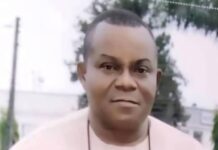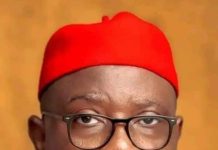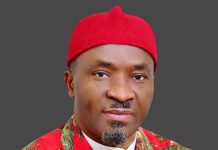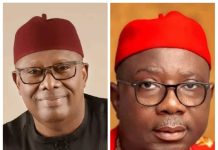George Alagiah’s death is a great loss to journalism. He was an excellent professional whose career was a cross between the print and broadcast media. We first met in the ‘80s when he was with the defunct South magazine in London. He crossed over to broadcast journalism by joining the BBC, where he made name for himself and became a star foreign correspondent and one of the most familiar faces of the BBC.
We met in South Africa during the dying days of apartheid where he was based as Africa Correspondent for the BBC. I was the London Bureau Chief for NEWSWATCH. And I had moved to South Africa myself, reporting from there for the Nigerian newsmagazine.
When I started AFRICA TODAY, I was on a visit to South Africa and on my way out back to London I was stopped and detained by a White South African immigration officer who erroneously believed my Nigerian passport I was traveling with was fake. I was detained and locked up at a detention camp a few kilometres away from the airport. All my friends and colleagues in South Africa thought I had left and successfully arrived back to base in London. I was desperate to make telephone calls to let them know of my predicament. And get them to inform my wife in London about what had happened to me. I noticed that the officer at the detention camp had a telephone in his office placed on his desk. Before I was locked up in a cell, I asked if I could make use of his telephone. He was so nice. He obliged. I called two people. The first was George Alagiah. The second was a respected influential South African journalist and Editor of the Cape Town based newsmagazine, LEADERSHIP, Paul Bell. I told them what happened and let them know where I was – locked up in a cell at an immigration detention camp.
Suddenly, I heard a bang on the door of my cell. It was one of the immigration police. He opened the door with his keys and said: “BBC is here to see you”. Immediately, I knew that must be George Alagiah. I was allowed to come out of the room to see him. He wasn’t allowed inside. We spoke across the large gate of the detention camp. He came with his darling wife, Frances. They brought me food and drinks. He was the one who called my wife, Titilope, in London to inform her about what had happened to me, but assured her not to be unduly worried, that I would soon be out.
George also called the Nigerian High Commission in Johannesburg to inform them. It was a weekend. The High Commissioner, the late Alhaji Shehu Malami, was out of town. But George got his deputy. Before I knew it, the Nigerian Deputy High Commissioner with some staff were there to see me at the detention camp. They quickly took over the case. They acted speedily and professionally. One of them was detailed to stay with me at the camp, while the deputy High Commissioner started the process of securing my release.
I had to spend the night locked up inside a cell in the camp. Thank God I was the only one inside the cell. Next door was like a dormitory, with some wild detainees. The next day, sporadic movement and action started over my detention. Paul Bell had called the office of the South African Minister of Home Affairs, the powerful Inkatha Chief, Mangasotho Buthelezi to report the case. He followed up with a strongly worded letter drawing their attention to the likely diplomatic row that might happen between South Africa and Nigeria if I was not released immediately.
Promptly, flurry of activities started at the camp. Cars from the Nigerian High Commission had arrived. Followed by convoys of cars from Chief Buthelezi’s Office. In no time, the door of my cell was opened. I was asked to take my suitcase with me. I was wondering what was going to happen next.
When I came out of the cell, I saw long queues of exotic cars with diplomatic number plates and from the South African government. I saw the Nigerian Deputy High Commissioner himself (whose name I unfortunately cannot remember) personally present. He had my passport, which had been seized by the South African authorities in his hand. It had been handed over to him.
The High Commissioner was accompanied by senior officials from the South African government. I was released and handed over to the High Commissioner. I entered the High Commissioner’s car. And the long convoy of cars from both the High Commission and South African government drove me all the way to the Nigerian High Commission in Johannesburg. The South Africans left and made arrangements for me to fly back to London the following day. It was an ordeal! I regained my freedom. I had my first shower in almost three days at the High Commission and my first real meal.
It was George Alagiah and Paul Bell that started the whole process that secured my freedom. And I was extremely grateful to the High Commissioner and his embassy staff for fighting on my behalf. They were so professional.
On the day I was leaving, guess who was at the airport to ensure that I was safely on board the British Airways flight to London? It was George Alagiah! Nothing else can describe the humaneness in him. He was a good friend, a good person, a brilliant reporter and television presenter. We’ve been in touch with each other over the years of his battle with cancer. Herewith are two of his text messages to me. The second one was only sent to me by him a few weeks ago:
“Dear Kayode, your messages always cheer me up because though we don’t see each other they speak of a long-standing connection. Thank you for your prayers. I need them right now. My latest scan showed a progression of the cancer. I have re-started the more aggressive treatment that I was on a few years back. Please give Titi a virtual hug from both me and Fran. George x”
The second one just a few weeks ago:
“Dear Kayode, Frances and I are truly touched to hear from you and Titi. It brought back many memories. This month, it is nine years since I was first given a terminal diagnosis. For most of that time, my doctor has been able to keep the cancer at bay, but, unfortunately, in recent months, the cancer has found a way round some of the drugs. I’m on a very toxic treatment at the moment, and early signs are that it might be working partially. It is the last of the known drugs for my condition. In the meantime, we feel blessed to have had these last nine years, years we never expected to have together. We’ve had the joy of watching our family grow with three granddaughters. We are blessed. Thank you for keeping us in your prayers. George X”
I was in my study early yesterday morning, working on some stories, when one of my Africa Today staff broke the sad news to me: “Your family friend, George Alagiah has died. I know he’s your family friend because I once picked his call at the office when he called for you.” It was a timestopper!
May his precious soul rest in peace.
On behalf of my wife, Titilope, and my family, I extend our heartfelt condolences to Frances, the children, and grandchildren. God bless his soul. Sleep well my friend!
















